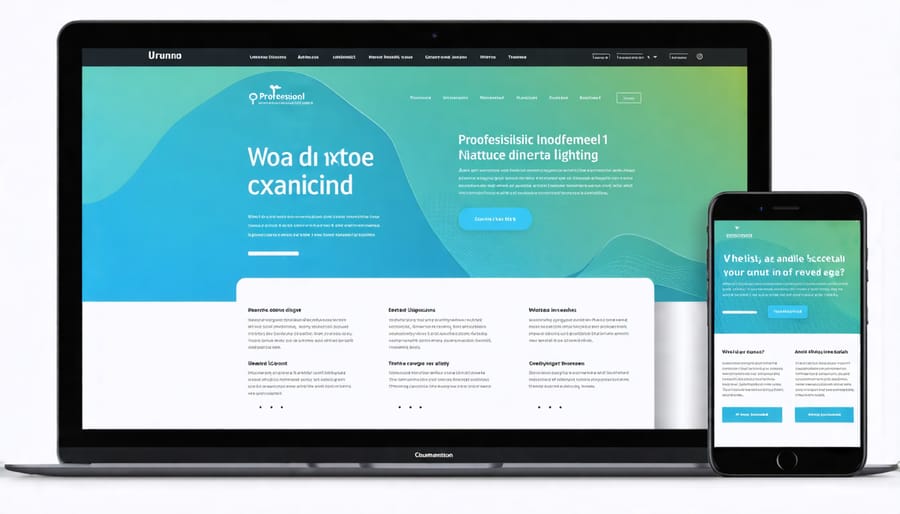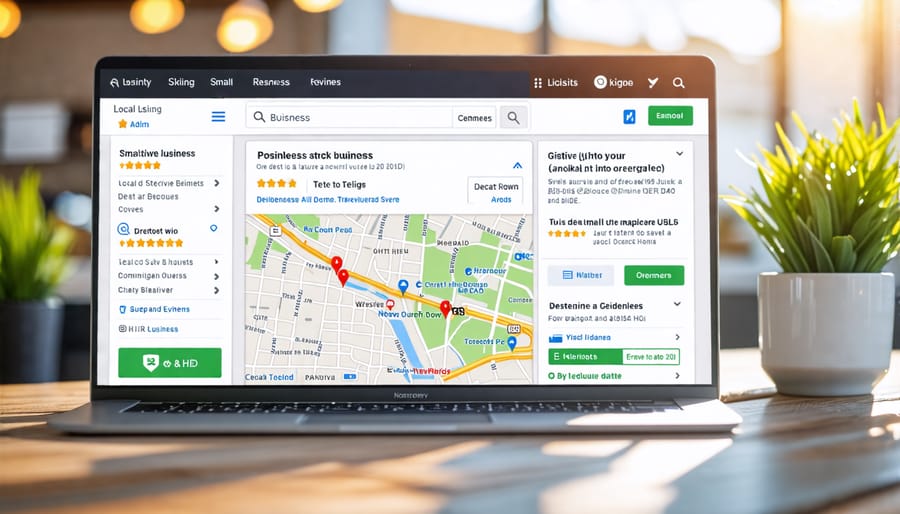Harness the power of digital marketing to propel your small business to new heights. In today’s fast-paced, interconnected world, leveraging online strategies is essential for entrepreneurs looking to expand their reach, engage customers, and drive growth. This article provides a comprehensive guide to the most effective digital tactics, equipping you with the tools and knowledge needed to thrive in the digital landscape. From optimizing your website for search engines to crafting compelling social media campaigns, we’ll explore proven techniques that deliver tangible results. Whether you’re just starting out or seeking to take your established business to the next level, these insights will help you navigate the ever-evolving digital realm with confidence and precision. Get ready to unlock the full potential of your small business in the digital age.
Build a Professional Website

Key Elements of a High-Converting Website
To create a high-converting small business website, focus on key elements that engage visitors and drive them to take action. First, craft a compelling headline that clearly communicates your unique value proposition. Pair this with persuasive copy that addresses customer pain points and highlights benefits. Prominently feature a strong call-to-action, such as “Shop Now” or “Book a Consultation,” to guide visitors toward conversion. Establish trust by including customer testimonials, logos of well-known clients, and trust badges. Ensure your website is mobile-friendly and loads quickly, as nearly 60% of web traffic comes from mobile devices. Incorporate eye-catching visuals, like high-quality product images or engaging videos, to capture attention. Finally, simplify your navigation and checkout process, making it intuitive for visitors to find what they need and complete their purchase. By prioritizing these essential components, you’ll create a website that effectively converts visitors into customers.

Develop a Strong Social Media Presence
Crafting an Engaging Social Media Strategy
Creating an engaging social media strategy is crucial for small businesses looking to connect with their target audience. Start by defining your goals, whether it’s increasing brand awareness, driving website traffic, or boosting sales. Next, research your target audience to understand their preferences, interests, and the platforms they frequent. Develop a content calendar that outlines the types of posts you’ll share, such as informative articles, behind-the-scenes glimpses, or user-generated content. Ensure your content is visually appealing and includes relevant hashtags to increase discoverability.
Consistency is key when it comes to social media. Aim to post regularly and engage with your followers by responding to comments and messages promptly. Consider collaborating with influencers or other businesses in your niche to expand your reach. Don’t forget to track your performance using analytics tools to see what’s working and what needs improvement. By continually refining your strategy based on data-driven insights, you’ll be able to craft content that truly resonates with your audience and drives meaningful results for your small business.
Harness the Power of Email Marketing
Email marketing is a powerful tool for small businesses to nurture leads and build lasting customer relationships. By sending targeted, personalized emails, you can keep your business top-of-mind and guide prospects through the sales funnel. To get started, build an email list by offering valuable content, such as a newsletter or exclusive promotions, in exchange for contact information.
When crafting email campaigns, focus on providing relevant, engaging content that addresses your subscribers’ needs and interests. Segment your list based on factors like demographics, purchase history, and behaviour to deliver more tailored messaging. Experiment with different subject lines, visuals, and calls-to-action to optimize your open and click-through rates.
Consistency is key – establish a regular sending schedule to stay connected without overwhelming subscribers. Monitor your campaign metrics and gather feedback to continually refine your approach. Remember, the goal is to build trust and credibility with your audience over time. By following these best practices and staying attuned to your customers’ preferences, email marketing can be a cost-effective way to drive engagement, conversions, and long-term growth for your small business.
Optimize for Local Search
For small businesses targeting local customers, optimizing for local search is crucial. When people search for nearby products or services, you want your business to appear prominently in the results. Start by claiming and verifying your Google My Business listing, which allows you to provide accurate information about your business, such as address, phone number, hours of operation, and photos. Encourage satisfied customers to leave reviews on your Google listing, as positive reviews can significantly boost your local search rankings.
Incorporate local keywords throughout your website’s content, such as your city, neighbourhood, or region, to help search engines understand your business’s location and relevance. Create location-specific pages on your site if you serve multiple areas, and include relevant content and testimonials for each location.
Building local citations by listing your business on reputable online directories and local business associations can also improve your local search visibility. Ensure your business information is consistent across all listings to avoid confusion for search engines and potential customers.
Engaging with your local community both online and offline can further enhance your local search presence. Participate in local events, sponsor community initiatives, and partner with other local businesses to build relationships and earn local backlinks to your website. By adjusting marketing strategies to focus on local SEO, small businesses can attract more nearby customers and establish themselves as trusted members of their community.

Invest in Targeted Online Advertising
In today’s digital landscape, online advertising is a powerful tool for small businesses to reach their target audience effectively. By investing in targeted campaigns, you can maximize your marketing budget and drive measurable results.
Two of the most popular platforms for online advertising are Google Ads and Facebook Ads. With Google Ads, you can display your ads to people actively searching for products or services like yours. This allows you to reach potential customers at the exact moment they’re ready to make a purchase. Facebook Ads, on the other hand, lets you target users based on their interests, demographics, and behaviours. By crafting compelling ad copy and eye-catching visuals, you can stop users from scrolling and grab their attention.
To create an effective online advertising campaign, start by defining your target audience. Consider factors like age, location, interests, and pain points. Next, set clear goals for your campaign, whether it’s driving website traffic, generating leads, or boosting sales. Choose the platform that aligns best with your objectives and audience.
When crafting your ads, focus on highlighting your unique value proposition. What sets your business apart from competitors? Use strong calls-to-action to encourage users to take the next step, whether it’s visiting your website, requesting a quote, or making a purchase.
Finally, monitor your campaign performance closely. Track metrics like click-through rate, conversion rate, and return on ad spend. Use this data to continuously optimize your campaigns, testing different ad copy, visuals, and targeting options to improve results over time.
By investing in targeted online advertising, you can efficiently reach your ideal customers and grow your small business in the digital age.
Provide Value with Content Marketing
Content marketing is a powerful tool for small businesses to attract and engage potential customers by providing valuable, relevant content that addresses their needs and interests. By creating content that resonates with your target audience, you can build trust, establish your expertise, and ultimately drive more sales.
Some effective types of content marketing for small businesses include:
– Blog posts: Share helpful tips, industry insights, and answers to common questions related to your products or services. Consistency is key, so aim to publish new posts regularly.
– Videos: Create engaging video content such as product demos, how-to tutorials, or behind-the-scenes glimpses into your business. Keep them short and shareable on social media.
– Infographics: Present complex information or data in a visually appealing, easy-to-digest format. Infographics are highly shareable and can help you attract backlinks to your website.
– Case studies: Showcase real-life success stories of how your products or services have helped customers solve problems or achieve their goals. This builds credibility and trust with potential buyers.
– Ebooks and whitepapers: Offer in-depth guides or reports that provide valuable insights and actionable advice related to your industry. Use these as lead magnets to grow your email list.
Remember, the key to successful content marketing is consistently delivering high-quality, relevant content that meets the needs of your target audience. By doing so, you’ll attract more qualified leads and build lasting relationships with your customers.
Measure, Analyze & Adjust
Measuring, analyzing, and adjusting your digital strategies is crucial for the long-term success of your small business. By regularly tracking key performance indicators (KPIs) such as website traffic, engagement rates, and conversions, you can gain valuable insights into what’s working and what needs improvement. Use tools like Google Analytics to monitor your website’s performance and identify trends or patterns in user behaviour.
Analyzing the data you collect allows you to make informed decisions about optimizing your digital strategies. Look for areas where you can refine your approach, such as targeting a more specific audience, adjusting your ad copy, or streamlining your website’s user experience. Don’t be afraid to experiment with new tactics and test different variations to see what resonates best with your target market.
Remember that digital marketing is an ongoing process, and what works today may not be as effective tomorrow. Stay agile and be prepared to adapt your strategies as needed based on the insights you gather from your metrics. By continuously measuring, analyzing, and adjusting your approach, you can stay ahead of the curve and ensure your digital efforts are always driving meaningful results for your small business.
Conclusion
In conclusion, the seven digital strategies covered – establishing an online presence, leveraging social media, optimizing for local search, investing in content marketing, utilizing email marketing, implementing online advertising, and analyzing digital performance – offer significant potential for Canadian small businesses to grow and thrive in today’s digital landscape. By embracing these tactics and adapting them to your unique business goals, you can expand your reach, engage with your target audience, and ultimately drive more sales and revenue. Remember, success in the digital realm requires consistent effort and a willingness to learn and adapt. Start by implementing one or two strategies and build from there. With dedication and a strategic approach, you can position your small business for long-term success in the ever-evolving digital world.
You may also like
-
Revamp Your Small Business: Digital Transformation Success in Canada
-
Transform Your Small Business with Must-Have Automation Tools
-
Boost Your Small Business with Google Analytics: A Step-by-Step Approach
-
Boost Team Spirit Fast: 5-Minute Activities for Busy Small Groups
-
Boost Your Business: Proven Brand Strategy Tips for Small Canadian Entrepreneurs

